To conservationists and the simple-minded folks of Weppa in Etsako East Local Government Area of Edo State, Nigeria, it is “bravo” that ringed birds ceaselessly migrate from distant countries in Europe, America, Africa and other continents of the world to its neighbourhoods of Weppa Farms.

Classified by key global conservation institutions as an International Bird Area (IBA) and Key Biodiversity Area (KBA), it is a significant transit/destination to the itinerant birds as well as a home to a high number of species; some endangered or are going extinct.
Bird ringing is the attachment of a small, individually numbered metal or plastic tag to the leg or wing of a wild bird to enable individual identification. This helps in keeping track of the movements of the bird and its life history.
With the presence of pervasive indigenous and migratory bird species, visitors in the mode of birdwatchers, eco-tourists and ornithologists (a tongue-biting-word for those who study of birds), throng there to observe all, including the “flying visitors”, which the innocent villagers willingly grant recurring “asylums” without “visas and travel restrictions”.
Yet again on November 11, 2020, a “Lesser Spotted Eagle” (Aquila pomarina), born in July 12, 2020, wearing a yellowish “TEZ DEH CA 16564” tag on the leg, flew all the way from Gustrow in Germany (coordinate 53°56’00″N 12°29’00″E) to the serene Weppa neighbourhood in Nigeria (7°02’22″N 6°33’59″E). Via a letter dated November 12, 2020 by Beringunszentrale Hiddensee, Official Ringer of the bird authenticated its identity.
Hiddensee gave the time-lapse of the bird’s disappearance in Germany and discovering in Nigeria as 122 days, on a distance of 5,081 km. Perhaps the timeline was much longer than that of the average ringed aquatic birds of near equal distance from Finland to Taraba State, Nigeria, which stayed only about a month. The delay of the German bird might be that it was found sick and wounded, leading to its treatment at Weppa Farms, with the aim to release it after recovery.
The Weppa’s neighbourhood had been in the global news spotlight for long. For instance, 25 years ago, the discovery of a rarest Vemiculated Fishing Owl (Scotopelia bouvieri) in the vicinity dominated the world news. That was an amazing discovery by “Eagle-eye” Phil Hall.
For decades, Weppa had had the nurturing support of Mr A. P. Leventis, a flawless conservationist and birdwatcher, whose second nature for caregiving encouraged Weppa as an integrated farm settlement, Agricultural College, Conservation Resource Centre and IBA/KBA. Suffice that Mr Leventis and his associates like the aforementioned Sir Phil Hall OBE, Nick Ashton Jones and others, with relentless conservation and agricultural activities in Nigeria, had groomed numerous young Nigerians, in a generational knowledge and practice transfer bid.
Yet, “Nigeria hasn’t a strong tradition or culture of birdwatching and bird study/ornithology. It is a relatively new field of study herein that is just developing,” retorted Sam Ivande, a PhD holder in Ornithology from the St Andrews University of United Kingdom (U.K.), who is a lecturer at the degree awarding A.P. Leventis Ornithological Research Institute (APLORI) of the University of Jos, Nigeria.
Ivande joins Hope Usieta and other young Nigerians, nourished by the Leventis Foundation-Nigeria (LFN). Usieta, LFN’s boss, is a Cambridge University, U.K., Ph.D holder in Ornithology, and a visiting lecturer to APLORI.
Dr Joseph Onoja, Director, Technical Programmes with the Nigerian Conservation Foundation (NCF), praised the efforts of the Weppa IBA/KBA, which he said is as a result of the nurturing by APLORI, a dependable partner of NCF.
Onoja spoke elatedly about the NCF’s flagship Bird Study Office located in Buru, Donga, Taraba State. Between 1996 and 1997, before the setting up of the Buru Bird Project, this writer and some foreign bird observers, a thing lavishly reported by the global press, discovered Taraba, a fringe north-east state of Nigeria, as a transit/destination of seasonal migratory birds ringed in Germany, Sweden, Holland and Finland.
But the useful lessons derivable from the Weppa IBA/KBA’s success story is the benchmark record set for exploitative multinational companies, not to deviate from exemplary Corporate Social Responsibility principle, where the Leventis Foundation-Nigeria and its appendage Weppa Farms could squeeze a vast 4,000 hectares for conservation, from a merely 13,000 hectares total ceded to them for agriculture and livelihood sustainability drives, to aid local communities.
By Tony Erha
Erha is a journalist and conservationist
